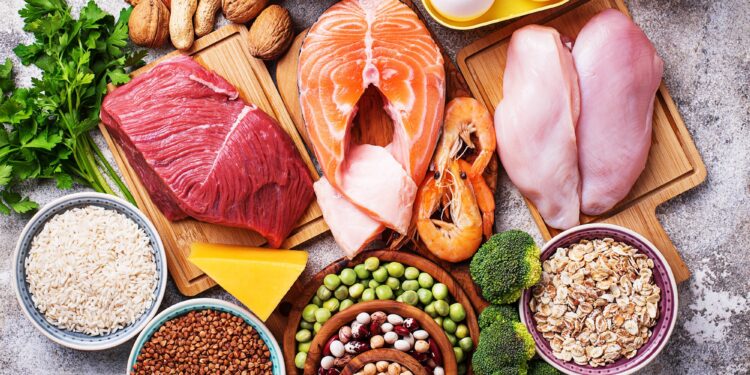Consuming protein is an essential requirement that cannot be compromised. Similar to carbohydrates and fats, protein is a macronutrient that our bodies require in significant and regular amounts, unlike micronutrients such as vitamins and minerals. However, our protein needs vary depending on factors like age, gender, activity levels, and other individual characteristics. Consequently, accurately determining our protein requirements can be challenging, particularly due to contradictory information regarding the ideal protein intake.
On the one hand, the National Diet and Nutrition Survey shows that we exceed our daily protein recommendations, which scientists say could shorten our lives. On the other hand, says Patel: “What I see in my clinical practice is that around 80% of my clients are not eating quite enough.” The booming protein industry, with its bars, pouches, and shakes, would have us believe the more is always the merrier. So how much protein should we be eating?
Daily Recommended Protein Chart
Just like any other nutrient, there exists a government-recommended quantity of protein that individuals should consume daily. The Recommended Dietary Allowance (RDA) for protein serves as the fundamental guideline for determining the appropriate protein intake. Depending on factors such as age, weight, height, and activity level, certain individuals may require a higher protein intake than the recommended amount.
The U.S. Department of Agriculture (USDA) publishes guidelines about protein goals. They recommend that most adults try to get between 10% and 35% of their daily calories from protein sources. For a 2,000-calorie diet, this would be between 200 and 700 calories from protein. Another way of looking at it is to aim for about 7 g of protein per 20 pounds of body weight.
The daily recommended intake of protein by sex and age is;
- Infants: 11 g
- Children: 19 to 35 g
- Teenage females: 46 g
- Teenage males: 52 g
- Adult females: 46 g
- Adult males: 56 g
- Pregnant people: 70 g
Factors That Influence How Much Protein To Eat Daily
Nutritional requirements shift during pregnancy, leading to a higher recommended intake of protein. Pregnant individuals may be advised to consume a minimum of 60 g of protein daily. As a result, protein sources could account for 20% to 25% of their total daily caloric intake.
One way of understanding protein needs in pregnancy is to calculate the grams of protein needed per kilogram (kg) of body weight (g/kg). The recommended amount is between 0.88 g/kg and 1.1 g/kg of protein. For example, a 68 kg (150-pound) pregnant person should aim for 60 to 75 g of protein daily.
Additionally, individuals who engage in higher levels of physical activity may require an increased daily intake of protein. Protein plays a crucial role in the development and preservation of muscle mass.
One study recommends that activity level be considered in calculating protein needs.
Wu G. Dietary protein intake and human health. Food Funct. 2016;7:1251-65. doi:10.1039/c5fo01530h
The authors of this study recommend people who exercise regularly or are athletes base their protein consumption on activity levels and body weight, as follows:4
- Minimal activity levels: 1.0 g/kg (68 g for 150 pounds)
- Moderate activity levels: 1.3 g/kg (88 g for 150 pounds)
- Intense activity levels: 1.6 g/kg (109 g for 150 pounds)
Elderly individuals must decelerate the decline in muscle mass. A study indicates that higher protein intake could assist older adults in averting muscle loss and various health issues. The study recommends a protein intake of 1.2 g/kg per day for adults aged over 65 (equivalent to 82 g for a person weighing 150 pounds).
A higher protein diet may help in losing or maintaining weight. However, after weight loss, some people can’t maintain a high-protein diet for the long term. Weight might be gained back after about a year. The authors of one study advise people changing their diet for weight loss or maintenance to take their whole lifestyle into account when choosing an eating plan.
How To Get Enough Protein On A Meat-Free Diet
Some individuals may desire to incorporate a higher amount of protein into their diet by opting for plant-based sources. Prioritizing plant protein entails consuming a wider variety of food options such as soy-based products (like tofu), beans, peas, lentils, nuts, seeds, and whole grain products. Additionally, for individuals who include dairy and eggs in their dietary regimen, these items also serve as beneficial sources of protein.
MORE ALSO: Dr Arikana, Enabulele, Others Team Up For Ubuntu Awakening Summit
A few instances of plant-based protein sources that provide approximately 7 g of protein are;
- 2 ounces cooked beans, peas, or lentils (such as Bayo, black, brown, fava, garbanzo, kidney, lima, mung, navy, pigeon, pink, pinto, or soy, or white beans, or black-eyed peas or split peas, and red, brown, and green lentils)
- 1 tablespoon of peanut butter
- 4 ounces of nuts or seed
How To Up Your Protein Intake
If you are looking to enhance your daily protein intake, there are numerous approaches you can take. Initially, it is crucial to familiarize yourself with the various food sources that are rich in protein, particularly those derived from plants. Subsequently, you can reduce your consumption of low-protein foods and prioritize those that have a higher protein content.
Tracking nutrients in meals throughout the day will also help in understanding how much protein is eaten. Keeping a food log and adding up the amount of protein and total calories can guide hitting protein goals.
Here are some ideas to increase daily protein intake;
- Focus on adding a protein source to every meal during the day.
- Consider adding nut butter, which could be eaten with whole grain bread, fruit, or in a smoothie.
- Add raw nuts to yogurt, salads, or oatmeal.
- Add protein powder to a smoothie, yogurt, dairy or nondairy milk, or vegetable or fruit juice.
- Add tuna, salmon, sardines, or other canned fish to crackers, salads, or a sandwich.
- Add more protein to breakfast with eggs, cheese, or non-dairy milk.
All In All
The recommended daily intake of protein can vary depending on various factors. Age, weight, and activity level are all crucial considerations when determining the appropriate amount of protein for optimal health. Individuals who are pregnant, older adults, or athletes should pay particular attention to consuming higher amounts of protein daily.
While proteins derived from animal sources are more readily utilized by the body, incorporating plant-based proteins into one’s diet can also have positive effects on overall health. However, it is important to note that consuming excessive or insufficient amounts of protein over an extended period can potentially result in adverse effects.










